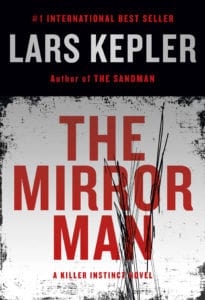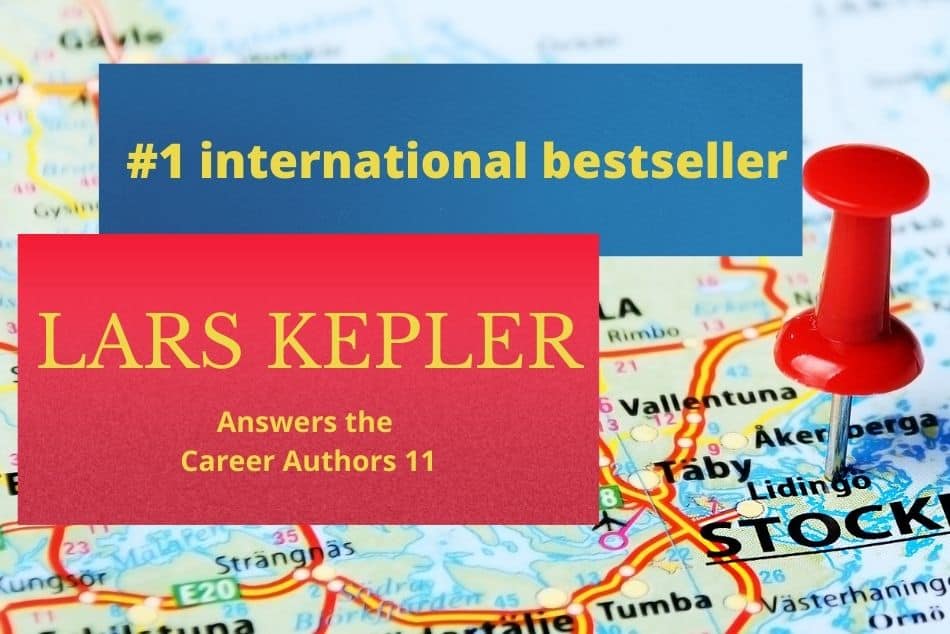True story. “Lars Kepler” is the pen name for Alexandra and Alexander Ahndoril, a husband and wife writing duo who live in Stockholm. Listen to this: Both Alexandra and Alexander were established writers in their own right before they adopted the Kepler pen name together. At first, they kept their real identities secret—no one knew who Lars Kepler was when they published their debut Kepler novel, The Hypnotist. Their debut was so popular in Scandinavia that there was an actual manhunt to uncover their identities. The Swedish media hired a profiler to build a profile of Kepler, and even had a tip line running to try to identify who was behind the pen name. But with their identities revealed–their success has continued. They are #1 international bestsellers and their books have sold more than 15 million copies in 40 languages. Their newest bestseller is THE MIRROR MAN.
And they have graciously agreed to answer the Career Authors 11.
1. What book changed your life? (And it might have been your own book!)
Alexandra: It happened when I was thirteen and read For Those I Loved by Martin Gray. It is an autobiography that describes how the author survived the Holocaust. To me, it was like my whole world fell apart. Even today, I get an almost unbearable feeling in my heart when I think about that book and how it opened my eyes to all the cruelty of this world. This book and others like it, are probably partly the reason why I started to write thrillers many years later. Because in a thriller, you will meet human cruelty, dig into it, but you can always turn at least the little world of the story right again. In the end, the heroes will win, and justice will succeed (And yes, I know it’s fiction, but it feels good anyway).
Alexander: When I was a hungry reading teenager I started with Dostoevsky, Kafka, Sartre, Camus and I loved it, but I remember a lazy summer when I came over a copy of William Peter Blatty’s The Exorcist. It was an eye opener: fantastic storytelling, a brilliant idea followed through, wonderful characters and the best detective ever. This was a modern American bestseller, and it was so good, I was stunned.
2. Was your first published book the first manuscript you ever wrote?
Alexandra: No, I have been writing all my life, but had never thought of trying to be published. Being a writer felt way too big and important. Instead, I worked as an actress for several years until I met Alexander who actually was a writer. He persuaded me to give writing a serious try since writing isn’t that far away from acting. Both professions are about bringing words to life, to portray and imagine the inner lives and secret motives of very different characters.
Alexander: Yes, I was nineteen years old when I completed my first novel. I had never written before, not even a short story, I just read a tremendous amount. This was in the time before computers, so I used a typewriter and since I couldn’t afford to photocopy the manuscript, I sent the original to Sweden’s largest publishing house and it was accepted … And since then, I have been writing novels and plays for the theatre.
3. Stephen King says, “The hardest part is just before you start.” What’s the hardest part of writing for you?
Alexandra: I always feel a strange pain when a book of mine is released. It sounds weird, I mean, that is the whole point of it, isn’t it? But when you write a book, it’s like you have a wonderful secret that only belongs to you. When the book is out, that’s when the worries begin. It is a worn-out cliché, but the books are like your defenseless children who are brusquely sent out in the world, in a huge flow of other books. How will they survive?
Alexander: I have been a full-time writer for more than thirty years now, and I have never had a hard time getting started. I have so many ideas, I know it’s a privilege, but a lot of ideas also means that not every idea is a good one. And that’s the hardest part for me, when you are passionate, full of inspiration, give everything you have, but after some time realize it doesn’t work. You can change things, rewrite, come up with new twists, but you know it´s a farewell anyway.
4. Do you know the story’s ending before you start?
Yes, essentially. We never start writing until we have the whole story clear to us, scene by scene, character by character. But once you start writing, something magical happens: the characters start to live and sometimes they don’t do as you have planned – not at all, actually. Then you have to rethink – but that´s just a lovely part of the creative process. For us writing oscillates between having a fixed structure and go with the flow.
5. When you’re having a difficult writing day, what do you tell yourself (or each other) to get through it?
Alexandra: One of the best things about being two writers is that you can always be at the top of your inspiration – we give each other new input all the time.
Alexander: Sometimes I only write dialogue – I hear the voices of the characters, even though I can’t see them. But since we are two writers, I don’t have to worry about that. I just write as fast as I can to catch their conversation and then I give the dialogue to Alexandra. When I get it back, everything is there, the characters’ faces, bodies, clothes, the situation they find themselves in. And then I continue and add new complications to the situation and so on before Alexandra takes over again.
6. Do you read your reviews?
We focus on our readers and try to consider a reviewer, even if he or she is very important, experienced, and knowledgeable, as just one reader, that is, always worth listening to, but not dictatorial.
7. Besides being persistent and correcting your spelling errors, what’s your best advice for a new author?
Write what you would like to read, something that makes your heart beat faster. For us, the core of all writing can be formulated as an unstoppable urge “listen now, I have something I have to tell you”. The second tip is that all the basic stories have already been told a thousand times. You have to ask yourself what is unique about your particular version, what makes it necessary? When you know that, you should try to do the most you can with it, don’t hold back, go all the way, make the story yours. The third piece of advice is to dare to be bad, never think about what family, friends, colleagues or critics might say or think, but just keep going until you find what needs to be said. You can always delete and edit the text afterwards, but it is important to let your inspiration bloom first.
8. What’s your definition of writer misery?
Alexandra: There are many miserable moments: I think the worst part is when I don’t manage to get the text to correspond to the vision I have in my head.
Alexander: I don’t know, I hate when the fingers on the keyboard don’t move as fast as the brain, when I chase forward not to lose the text I can feel is coming, what I have a glimpse of – and then that is exactly what happens and the faint vision is gone forever. It was probably not brilliant anyway, but I will never know. Another misery is that I often can’t interpret the notes I made by hand, I have written so fast that my handwriting is unreadable, no matter how hard I try, I can’t interpret it.
9. What’s your definition of writer happiness? Speaking of which–what’s your newest book, and how do you feel about it?
Writer happiness is when we are both at the peak of our creativity, sitting next to each other in front of our computers, writing for hours and the room gets a kind of crackling electricity … When we wrote The Mirror Man it was sometimes so intense that we had to take a break and walk away from our computers just to breathe for a while before we continued writing.
The Mirror Man is one of our darkest books so far. It starts with a girl vanishing on her way home from school. Five years later she is found murdered on a playground in the night in the middle of Stockholm. Detective Joona Linna studies the surveillance cameras and manages to trace a witness, a man with a dog stares in the direction of the homicide. It turns out that the witness is mentally ill, he doesn’t speak and has no memories of what he saw that night. Joona Linna then turns to his old friend, the hypnotist, and asks him to help the witness release the memories of that night.
10. What’s your favorite book on writing? Why did it matter?
We have never read any writing books or taken courses (but Alexandra was a teacher of a writing class at the university for some years). We have learned to write from reading. Reading a lot, all genres. But Alexander has a passion for all kind of screenplay structure and his favorite right now is Michael Hauges’ Story Mastery.
11. What book are you reading right now?
We work a lot, which includes a huge amount of research, and we have a big family with three daughters (and one boyfriend) – so for some years we have felt that we need more time to read just for pleasure. And last year we started a book discussion club, just for the two of us. It’s wonderful. The current book we are reading is Sally Rooney’s Beautiful World, Where Are You, and before that we read Emma Cline’s Harvey.
Have you read any “Lars Kepler”? What do you think about their responses? Let’s talk about it on the Career Authors Facebook page!
Detective Joona Linna is on the trail of a kidnapper who targets teenage girls and makes their worst nightmares a reality.
“Dark, disturbing, and chillingly relentless. Picture Hannibal Lecter sitting down to channel Stieg Larsson and then dial it way, way up!” —Brad Thor, #1 New York Times best-selling author

of Black Ice

Sixteen-year-old Jenny Lind is kidnapped in broad daylight on her way home from school and thrown into the back of a truck. She’s taken to a dilapidated house, where she and other girls face horrors far beyond their worst nightmares. Though they’re desperate to escape, their captor foils everyone of their attempts.
Five years later, Jenny’s body is found hanging in a playground, strung up with a winch on a rainy night. As the police are scrambling to find a lead in the scant evidence, Detective Joona Linna recognizes an eerie connection between Jenny’s murder and a death declared a suicide years before. And when another teenage girl goes missing, it becomes clear to Joona that they’re dealing with a serial killer—and his murderous rampage may have just begun.





